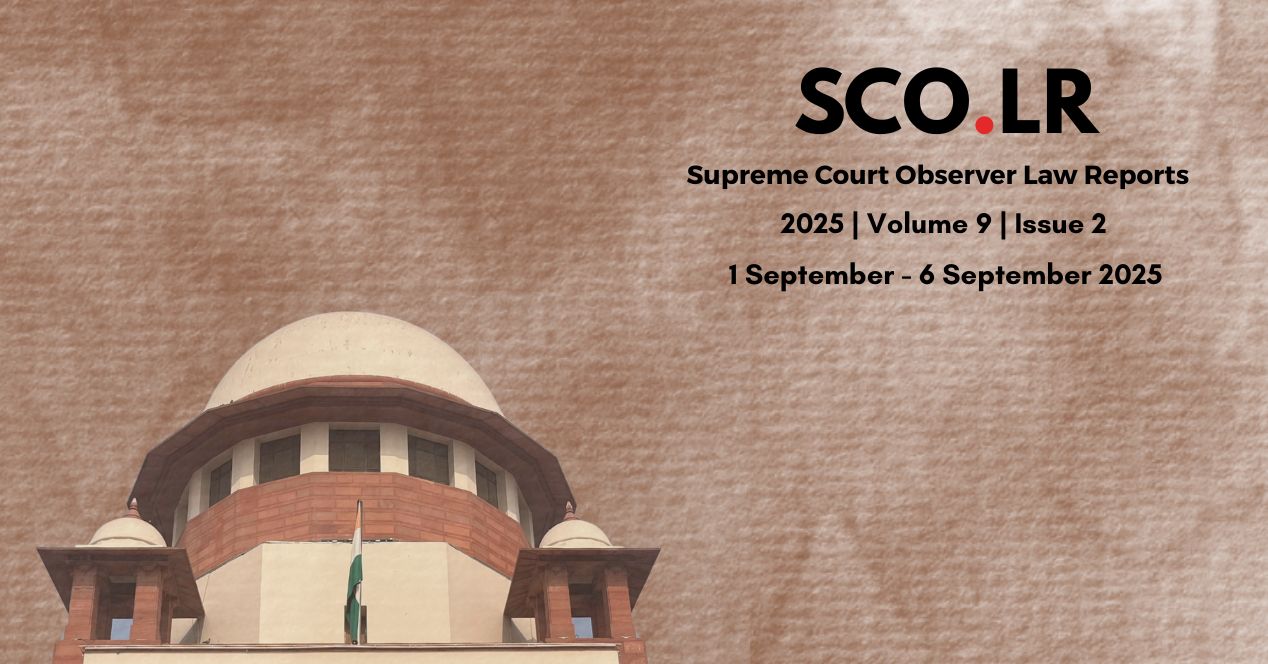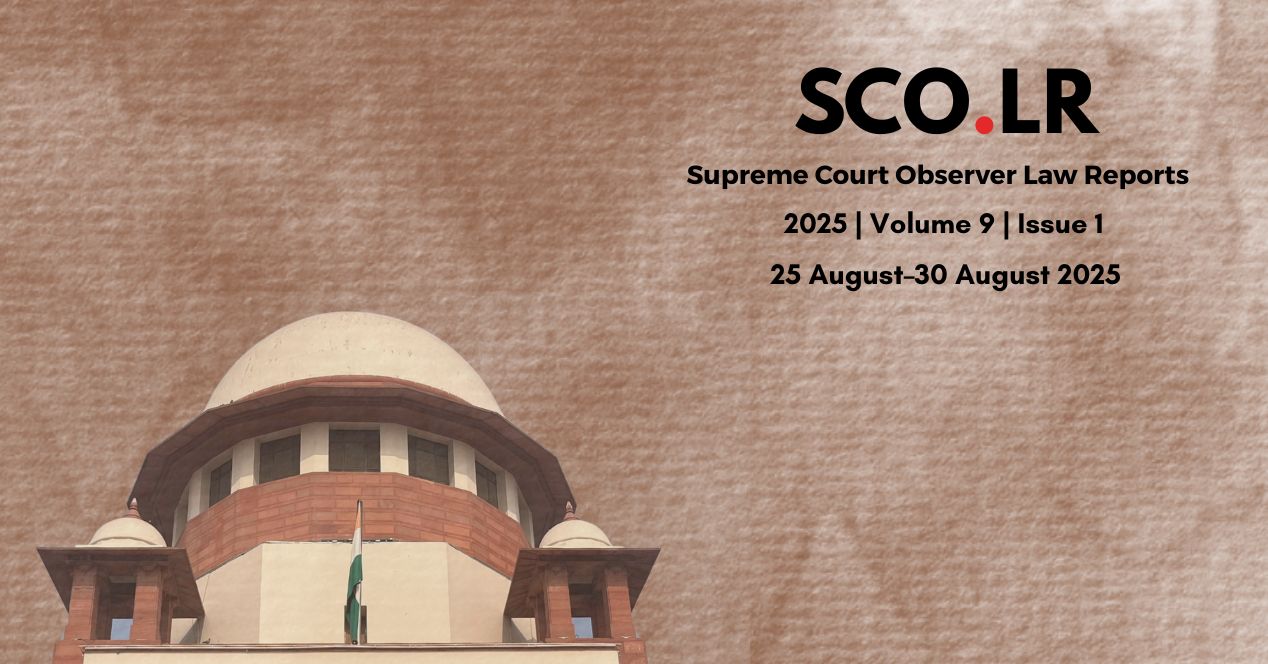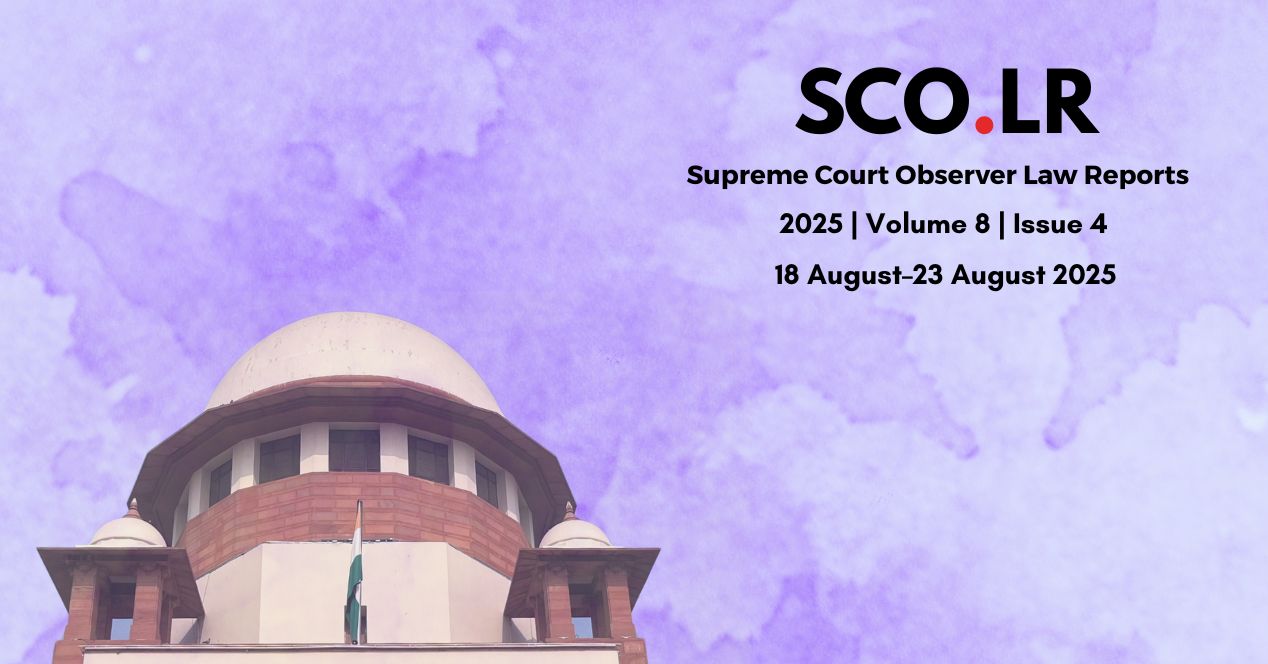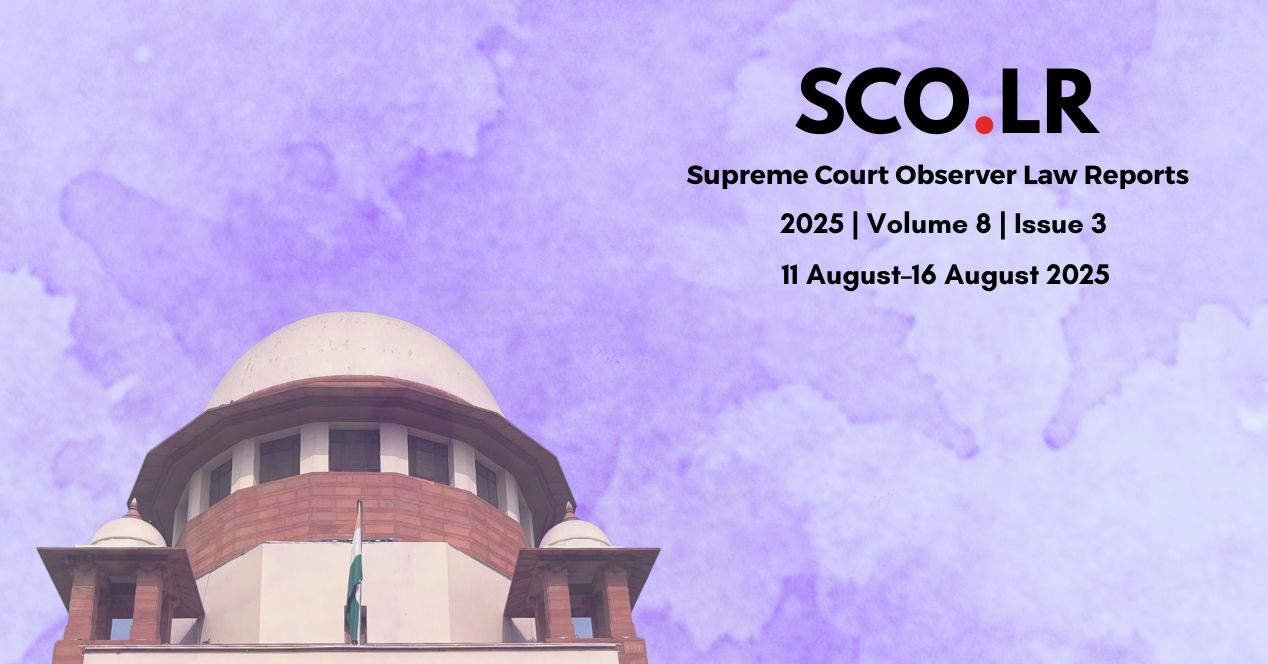Analysis
SCO.LR | 2025 | Volume 9 | Issue 3
In this Issue of SCO.LR, we bring you five important judgements from 8 September to 13 September 2025
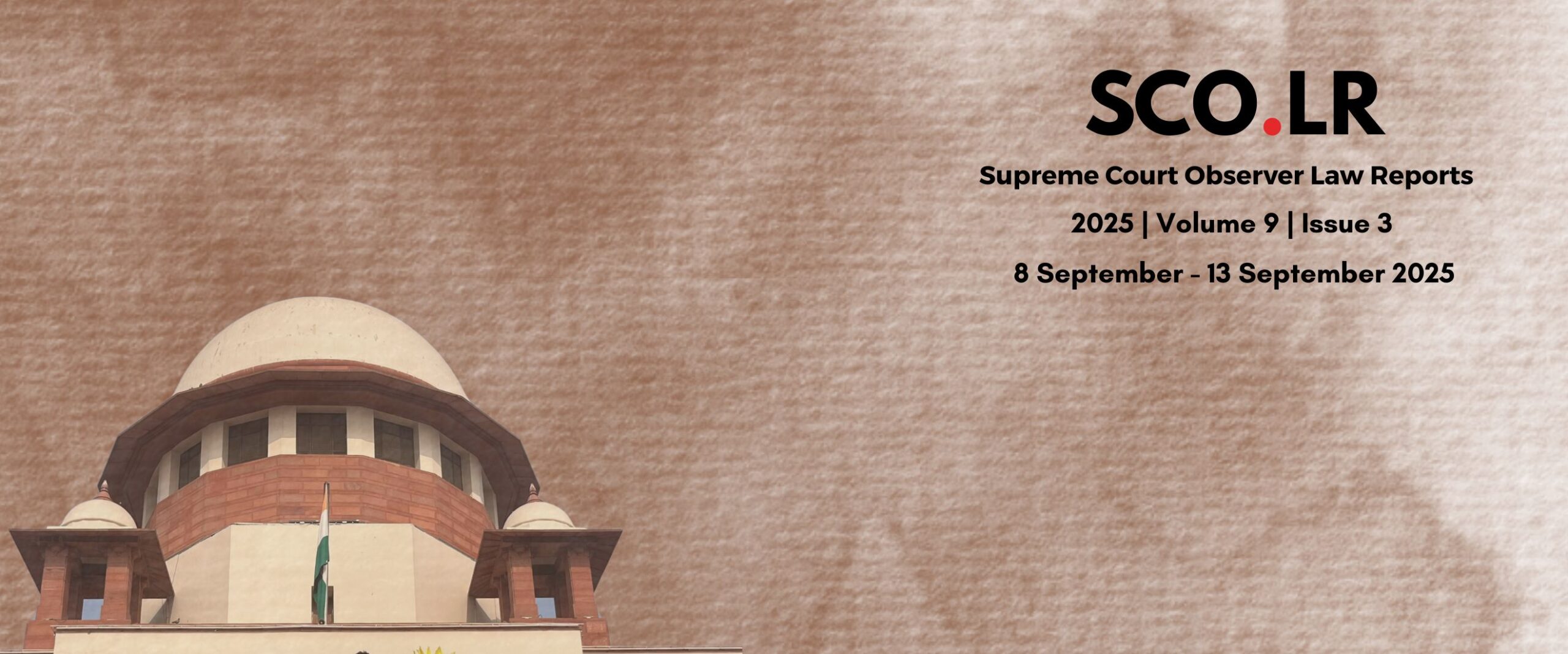
Volume 9 Issue 3 of the Supreme Court Observer Law Reports (SCO.LR) is here! The Issue carries summaries of five key judgements from the second week of September. The themes covered include: the limits of High Courts’ review jurisdiction; migration of reserved candidates to General posts; ingredients of fraud and forgery under the criminal laws and whether “speculative investors” can initiate insolvency proceedings. Read them all in HTML format on our SCO.LR page!
**********
The Supreme Court Observer Law Reports
SCO.LR | Volume 9 | Issue 3
8 September – 13 September 2025
**********
Review Jurisdiction to be Strictly Delineated
8 September 2025
Citations: 2025 INSC 1080 | 2025 SCO.LR 9(3)[11]
Bench: Justices Ahsanuddin Amanullah and S.V. Bhatti
The Supreme Court held that a court’s power to review its own previous order is strictly limited to correcting errors apparent on the face of the record and not to rehear or substitute a different view as if it were an appeal.
A preliminary decree for the partition of a family property was issued in 2003. Malleeswari, the daughter, sought to have it amended for a third of the share under the Hindu Succession (Amendment) Act, 2005, which grants daughters equal rights to ancestral property. The Trial Court dismissed her plea, stating that the 2005 Act would not apply “retroactively”. The Madras High Court upheld Malleeswari’s claim. However, the High Court set aside its prior Order in a review petition filed by a property purchaser. It remanded the case to the Trial Court to be heard afresh.
The Supreme Court found the High Court exceeded its review jurisdiction. Review is confined to correcting an “error apparent on the face of the record” or discovering new evidence, not to re-evaluating the case’s merits or substituting its own findings, which is akin to an appeal against its own order.
Key words/phrases: Review petition—limits of review jurisdiction of High Court—error apparent on the face of record—Partition suit under Hindu Succession (Amendment) Act, 2005—Madras High Court judgement set aside—akin to appeal
Read the Judgement here
**********
Migration of Reserved Candidates to General Posts Turns on Nature of Relaxation
Railway Protection Force v Prem Chand Kumar
9 September 2025
Citations: 2025 INSC 1083 | 2025 SCO.LR 9(3)[12]
Bench: Justices Surya Kant and Joymalya Bagchi
The Supreme Court held that the migration of SC, ST and OBC candidates to unreserved posts depends on the type of relaxations availed and the relevant recruitment provisions.
In the first dispute, reserved category candidates in recruitment for the Railway Protection Force had availed relaxations in age and physical standards. Though they scored more than the general cut-off, they were denied migration. The High Court ordered their appointment to unreserved vacancies, relying on Standing Order No. 78, which allowed migration on merit. The Supreme Court set aside this view, holding that Revised Directive No. 29 had made Standing Order No. 85 applicable, and Para 14(f) expressly barred candidates who had taken concessions in age or measurements from being counted against general vacancies.
In the second dispute, involving CISF recruitment, an ST candidate with a height of 163cm (165cm was the General Category requirement) scored 366 marks, which was higher than the general cut-off of 364. His selection in the unreserved category was challenged based on a 1998 Office Memorandum. The Supreme Court upheld the selection. Applying the ejusdem generis rule, it held that the expression “etc” in the Memorandum referred to items like age, experience and qualifications, and not physical characteristics like height or chest measurements.
Key words/phrases: Recruitment process—reserved category—unreserved posts—age relaxation—physical measurement relaxation—physical standard relaxation—migration of candidates—Railway Protection Force—Central Industrial Security Force—Standing Order—ejusdem generis
Read the Judgement here.
**********
Link between False Representation and Benefit Crucial in Cases of Fraud and Forgery
Jupally Lakshmikantha Reddy v State of Andhra Pradesh
10 September 2025
Citations: 2025 INSC 1096 | 2025 SCO.LR 9(3)[13]
Bench: Justices B.V. Nagarathna and Joymalya Bagchi
The Supreme Court held that deception alone does not constitute cheating—a deliberate intention to cause wrongful gain or loss must be established.
The case originated from a complaint by the District Fire Officer alleging that a college had obtained a Recognition Certificate by submitting a forged No-Objection Certificate (NOC). An FIR was registered and a chargesheet was filed, leading to proceedings under Section 420 of the Indian Penal Code, 1860. The High Court refused to quash these proceedings, prompting an appeal to the Supreme Court.
The Supreme Court set aside the High Court’s Judgement while noting that a Fire NOC was not required for the college’s building as per the National Building Code of India, 2016. Therefore, the essential ingredient to confirm an offence of forgery was missing, as there was no “vital link” between the alleged false representation and the issuance of the Recognition Certificate.
Key words/phrases: Section 420 of the Indian Penal Code, 1860—cheating—forgery—false representation—deliberate intention to cause wrongful gain—deception alone not considered cheating—High Court judgement set aside
Read the Judgement here
**********
Speculative Investors Cannot Invoke Insolvency Proceedings
Mansi Brar Fernandes v Shubha Sharma
12 September 2025
Citations: 2025 INSC 1110 | 2025 SCO.LR 9(3)[14]
Bench: Justices J.B. Pardiwala and R. Mahadevan
The Supreme Court held that speculative buyers or investors cannot file corporate insolvency petitions against borrowers under Section 7 of the Insolvency and Bankruptcy Code, 2016.
Two individuals invested ₹35 lakh and ₹25 lakh respectively in real estate projects with a buy-back clause. The project was not completed and cheques issued to them by the real estate company had bounced. Insolvency petitions under Section 7 were accepted by the National Company Law Tribunal (NCLT). On appeal, the National Company Law Appellate Tribunal set aside the NCLT judgement stating that the individuals were merely “speculative investors” who sought a lucrative return.
The Court confirmed the NCLAT’s decision. It observed that Section 7 of the IBC can only be availed by bonafide homebuyers and not speculative investors who treat real estate as a financial instrument. Possession is the primary indicator of bona fide intent.
Key words/phrases: Insolvency and Bankruptcy Code—Section 7—speculative investors—homebuyers—IBC not debt recovery forum—can only be availed by genuine buyers
Read the Judgement here.
**********
Right of Meritorious PwD Candidates to Unreserved Seat
Reena Banerjee v Government of NCT of Delhi
12 September 2025
Citations: 2025 INSC 1101 | 2025 SCO.LR 9(3)[15]
Bench: Justices Vikram Nath and Sandeep Mehta
The Supreme Court held that not allowing high-performing Persons with Disabilities (PwD) an unreserved seat defeats the purpose of reservation under Section 34 of the Rights of Persons with Disabilities Act, 2016—it denies an opportunity to a lower-scoring candidate to claim the reserved seat.
The Court had been monitoring various aspects of the implementation of disabilities legislation since 1998 when the Justice Sunanda Bhandare Foundation filed a writ petition seeking implementation of the 1995 Act. Most recently, the Court emphasised that reservation must reach those most disadvantaged by disability and deprivation and advanced a positive interpretation of Section 34 to protect the integrity of earmarked seats for PwD candidates.
The Court directed the Union to explain—by 14 October 2025—whether measures have been taken to provide the “upward movement” of meritorious candidates applying against the posts reserved for PwDs, when they secure more than the cut-off for the unreserved category. The Court clarified that the same principle applies to promotions.
Key words/phrases: Rights of Persons with Disabilities Act, 2016—Section 34—reservation in employment for PwD—actionable opportunities—other reserved categories entitled to social reservation under Article 16(4)—migration to general category for meritorious candidates—discrimination.
Read the Judgement here.

